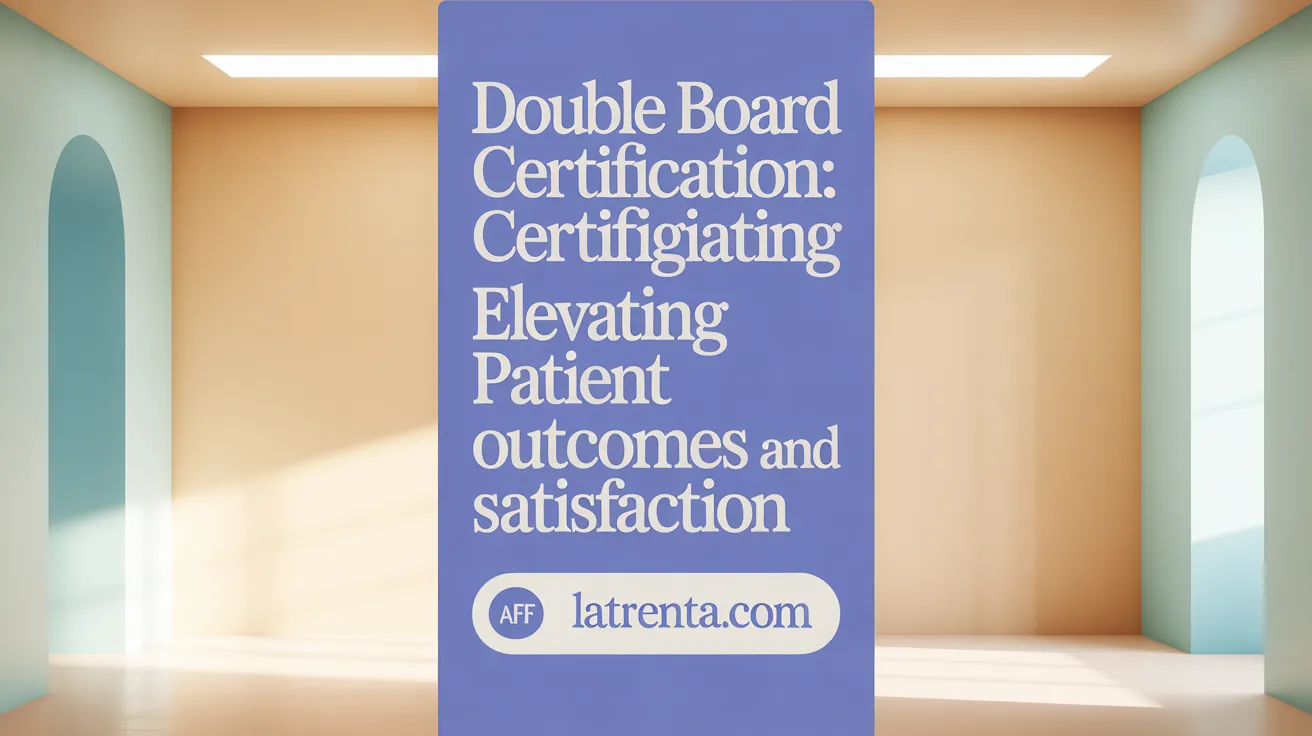Setting the Standard for Excellence in Plastic Surgery
In the evolving world of plastic surgery, the credentials of your surgeon should be paramount. Double board certification represents a surgeon's dedication to extensive training, rigorous testing, and continuous education across multiple specialties, ensuring unparalleled expertise and safety for patients. This article explores the vital importance of double board-certification and why it is a key factor in choosing a plastic surgeon for both cosmetic and reconstructive procedures.
Understanding Board Certification and Its Rigorous Pathway

What is board certification and what does it signify?
Board certification signifies that a physician has achieved a high level of expertise and skill by completing rigorous medical education and training. This process involves graduating from medical school and completing a demanding residency program specific to their specialty, such as plastic surgery or otolaryngology. Physicians must pass comprehensive oral and written examinations that test their knowledge and surgical skills. Beyond initial certification, doctors commit to ongoing professional development and strict ethical standards to maintain their certification. This assures patients receive care from highly qualified surgeons dedicated to safety and excellence (Importance of Board Certification).
What training and examinations are required to become board-certified?
The path to board certification starts with medical school, followed by an extensive residency training that typically lasts five or more years depending on the specialty. For example, plastic surgeons complete at least six years of surgical training, including focused plastic surgery residency (American Board of Plastic Surgery (ABPS) standards). Many surgeons pursue additional fellowship training for one or two years to gain subspecialty expertise, such as in facial plastic and reconstructive surgery certification. To earn certification, physicians must successfully pass rigorous written and oral exams administered by nationally recognized boards like the American Board of Plastic Surgery or the American Board of Otolaryngology-Head and Neck Surgery training. Maintaining certification also requires continuous medical education and periodic re-examination to keep up with evolving medical standards (Benefits of Double Board Certification).
Purpose and standards of certification boards
Certification boards exist to set and uphold comprehensive standards that ensure physicians meet the highest levels of Standards for Medical Practice and Patient Care. They serve to verify that surgeons have not only completed the necessary education and training but also adhere to ethical codes and safety protocols (American Board of Plastic Surgery Certification and ASPS Code of Ethics. These boards provide a reliable way for patients to verify the qualifications of their surgeons, ensuring trust and confidence in complex and often delicate procedures such as cosmetic and reconstructive surgery (Importance of Board Certification). The certification process is voluntary but highly valued as it reflects a surgeon’s commitment to excellence and patient safety (board certification significance).
The Added Value of Double Board-Certification in Plastic Surgery
What does it mean to be double board-certified?
Double board-certification means that a surgeon has successfully completed rigorous certification processes in two distinct specialty areas. This involves finishing medical school, completing separate residencies or fellowship programs, and passing comprehensive oral and written board examinations for both specialties. Maintaining dual certifications also requires ongoing education to stay current with medical advancements and ethics. This dual recognition reflects a surgeon’s extensive training and commitment to excellence in multiple fields, as explained by the Meaning of Board Certification.
What are the training pathways for dual certification?
The path typically starts with an initial residency in one specialty, such as otolaryngology (head and neck surgery) or general surgery. Following this, surgeons often pursue an additional fellowship—commonly in facial plastic and reconstructive surgery or cosmetic surgery—that provides specialized skills. This specialized training can last one to two years and focuses on advanced reconstructive and aesthetic techniques. After meeting all training and experience requirements, candidates sit for and pass certification exams from two different medical boards. Details of the Residency Training in Otolaryngology and Facial Plastic Surgery Fellowship are critical components of this pathway.
How does double board-certification enhance patient care?
Having dual certification broadens a surgeon’s expertise, enabling them to manage more complex surgical cases with a thorough understanding of anatomy and technical nuances. These surgeons offer a wider variety of procedures, including both cosmetic enhancements and reconstructive surgeries, ensuring a personalized approach tailored to individual patient needs. Their demonstrated dedication to continuous education and high safety standards reduces risks during surgery and improves overall patient outcomes and satisfaction. The Importance of Board Certification and Benefits of Double Board Certification emphasize these benefits for patients. Surgeons with double board certification meet Standards for Medical Practice and Patient Care and ensure high levels of surgical excellence.
What are common examples of dual certifications in plastic surgery?
Typical dual certifications include combinations such as:
| Primary Specialty | Additional Certification | Focus Area |
|---|---|---|
| Otolaryngology-Head and Neck Surgery | Facial Plastic and Reconstructive Surgery | Head and neck cosmetic and reconstructive surgery |
| General Surgery | Plastic Surgery | Broad reconstructive and aesthetic plastic surgery |
| Plastic Surgery | Surgery (General or other specialties) | Comprehensive surgical expertise for complex cases |
Double board-certified plastic surgeons integrate competencies from both disciplines, which elevates their ability to deliver superior care in facial, body, and reconstructive procedures. The Advantages of double certification in plastic surgery underscore the enhanced expertise and patient confidence in these surgeons.
Double Board-Certified Surgeons: Training and Professional Excellence
What specialized training do double board-certified plastic surgeons undergo?
Double board-certified plastic surgeons have completed extensive education and training. They undergo a plastic surgery residency lasting typically six or more years, which provides comprehensive surgical education and hands-on experience. Many also complete additional fellowship training in related specialties, such as facial plastic and reconstructive surgery or otolaryngology–head and neck surgery. This additional fellowship, often lasting one to two years, offers advanced, focused expertise in areas like facial anatomy, reconstructive procedures, and aesthetic surgery.
To achieve double board certification, surgeons must pass rigorous written and oral examinations administered by official boards such as the American Board of Plastic Surgery (ABPS), American Board of Otolaryngology, and the American Board of Facial Plastic and Reconstructive Surgery (ABFPRS). Maintaining certification further requires ongoing continuing medical education (CME), periodic re-examinations, and practice in accredited facilities to ensure safety and skill proficiency.
What are the professional and ethical standards expected from double board-certified surgeons?
Surgeons with double board certification commit to high professional and ethical standards. They strictly adhere to codes of ethics emphasizing patient safety, confidentiality, and well-being. Continuous education and training keep them abreast of evolving surgical techniques and safety protocols, allowing them to reduce complications and enhance outcomes.
Membership in respected professional societies, such as the American Society of Plastic Surgeons (ASPS) or the American Society for Aesthetic Plastic Surgery (ASAPS), signifies peer recognition and commitment to maintaining excellence. These organizations enforce codes of conduct and encourage surgeons to follow best practices in both clinical care and patient communication.
Examples of reputable surgeons and their credentials indicating double certification
Some esteemed double board-certified surgeons include Dr. Adam R. Kolker in New York City, certified by the American Board of Plastic Surgery and the American Board of Surgery, with extensive experience in cosmetic breast, body, and facial surgery. Dr. Jonathan Frankel of Cleveland holds dual certification in Facial Plastic and Reconstructive Surgery and Otolaryngology – Head and Neck Surgery, reflecting years of rigorous training and fellowship.
These surgeons exemplify the dedication required to reach this level of qualification, combining broad surgical knowledge with subspecialty skill to provide comprehensive and personalized patient care. Their ongoing commitment to education, ethical standards, and surgical excellence ensures high-quality outcomes and patient satisfaction in complex aesthetic and reconstructive procedures.
Why Patients Should Choose Double Board-Certified Plastic Surgeons

Why is choosing a double board-certified plastic surgeon crucial for patient safety?
Double Board-Certified Surgeons] have undergone extensive education and passed rigorous exams in two specialties, often including plastic surgery and a related field such as facial plastic surgery or otolaryngology. This comprehensive training equips them with advanced knowledge and skills to anticipate, prevent, and manage potential surgical complications effectively. Their adherence to strict safety protocols and accreditation standards helps minimize risks during both cosmetic and reconstructive surgeries, providing patients with a significantly safer surgical experience.
Expertise in managing complex procedures and complications
These surgeons’ dual certifications reflect mastery in multiple disciplines, enabling them to handle complex anatomical and aesthetic challenges with precision. Their broad skill set ensures that complicated procedures and any unforeseen complications during or after surgery are managed expertly, which can improve outcomes and patient satisfaction.
Assurance of natural, personalized, and high-quality results
double board-certified surgeons] combine deep anatomical knowledge and refined aesthetic judgment, allowing them to tailor procedures to each patient's unique features and goals. This commitment to natural and personalized results stems from their comprehensive training and continuous education to stay current with evolving techniques.
How can patients verify a surgeon’s double board certification and qualifications?
Patients should verify certification through official resources like the American Board of Plastic Surgery (ABPS)] and the [American Board of Medical Specialties (ABMS)]. Tools such as the American Society of Plastic Surgeons (ASPS) 'Find a Surgeon'] feature help confirm current certification status. Additionally, checking a surgeon’s hospital privileges, credentials, and patient reviews offers further assurance of their qualifications and commitment to safety and quality care.
The Impact of Double Board Certification on Patient Outcomes and Satisfaction

How does double board certification influence outcomes and patient satisfaction?
Double Board-Certified Surgeons] possess a combination of broad clinical knowledge and specialized surgical skills, enabling them to achieve more precise and natural-looking results. Their rigorous training in two specialties means they are adept at handling complex procedures and potential complications, which reduces risks during surgery. Furthermore, these surgeons commit to continuous education, staying at the forefront of medical advancements and adopting the safest techniques possible. This dedication to innovation and safety enhances patient outcomes and leads to higher satisfaction by ensuring results that are both aesthetically pleasing and medically sound.
What role does double board certification play in the surgeon-patient relationship?
Double Board Certification] contributes significantly to building patient trust and confidence. Knowing that a surgeon has met the demanding requirements of two distinct boards assures patients of the surgeon’s expertise and professionalism. These surgeons adhere to strict ethical standards, providing personalized care and thorough consultations. They take time to understand each patient’s unique needs and goals, tailoring treatments accordingly. This personalized approach, combined with transparent communication and adherence to high safety protocols, makes patients feel more comfortable and secure throughout their surgical journey.
Double board certification not only represents extensive training but also a surgeon’s dedication to excellence, safety, and ethics. Patients benefit from this by receiving care that is customized, innovative, and delivered by professionals deeply committed to their well-being and satisfaction.
Choosing Excellence: The Definitive Advantage of Double Board-Certified Surgeons
In the high-stakes field of plastic surgery, double board certification stands as a hallmark of superior expertise, rigorous training, and unwavering commitment to patient safety and care quality. For patients seeking aesthetic or reconstructive procedures, selecting a double board-certified surgeon offers confidence in their surgeon's comprehensive skills, ability to manage complex cases, and dedication to producing natural, personalized results. This dual credentialing not only enhances surgical outcomes but also supports continuous professional growth and ethical standards that protect patients. Ultimately, double board certification is an essential consideration for anyone prioritizing safety, excellence, and trust in their plastic surgery journey.
